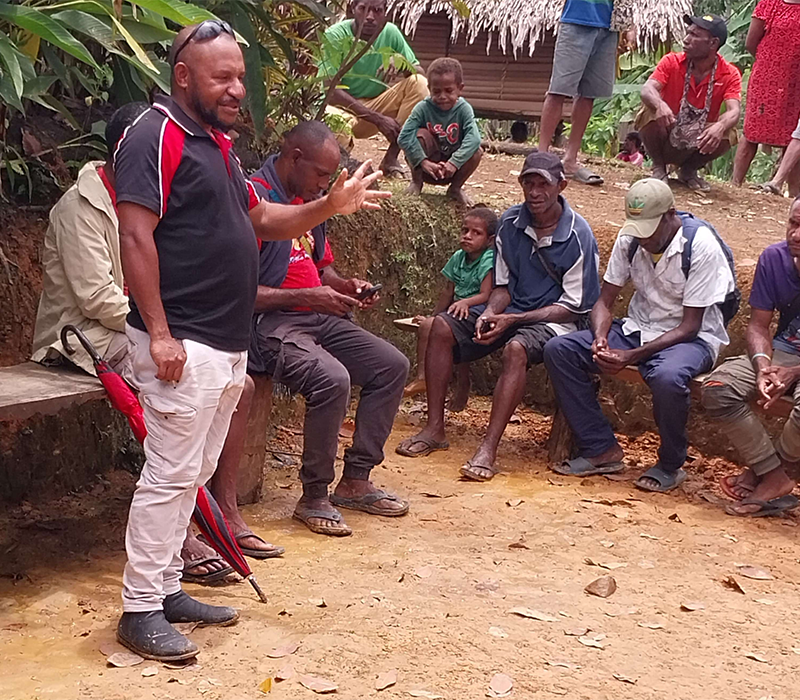Economic, Political and Cultural Brokers at a Resource Frontier in Papua New Guinea
How local brokers emerge, mediate flows of resources and manage (or exacerbate) contradictions, conflict and inequities.

About
This research project examines the role of brokers in shaping flows of knowledge, wealth and status at a resource frontier in Papua New Guinea, and how that role is changing as technologies such as mobile phones and associated social media platforms introduce new modes of engagement between local, national and global worlds.
As an extractive industry consolidates in a green field, particular individuals may emerge as brokers, acting to negotiate relations between members of their own community and representatives of the state, the companies and neighbouring communities. To the extent that such people are recognised and feted by outsiders, so they are vulnerable to becoming complicit in, or submerged by, an ethos of inequality that, initially, they sought to manage on behalf of their constituents. In contexts of these kinds, brokers may contribute both to differentiating the domains that they purport to bridge and to enhancing inequalities in their home communities.
By following the trajectories that key individuals from one community follow, and how these are fostered and interpreted by the audiences to whom they play, we are investigating the demands that brokers service, their positioning, and the tensions they seek to mediate.
Outcomes/Activities
We aim to:
- Analyse the socio-political dynamics at resource frontiers, which will be of real value to policymakers grappling with how to manage competition over the benefits of development and resentment over frustrated expectations, as energy futures are negotiated;
- document the challenges that people at the margins of resource projects face in seeking brokers to negotiate development in their communities;
- provide a resource to local communities to assist them in negotiating their futures, by clarifying the different forms of brokerage in which people are engaged;
- contribute to anthropological theories of brokerage and its role in shaping trajectories of social change;
- build collaboration in research and research training between anthropologists at The University of Melbourne and those at the University of Papua New Guinea.
Impact
- Publication of a chapter on brokerage in an edited volume, Capital and Inequality in Rural Papua New Guinea, The Broker: Inequality, Loss and the PNG LNG Project (anu.edu.au);
- Ongoing contributions to MA research programs with students at the University of Papua New Guinea;
- Engagement with Australian High Commission officials in Port Moresby (November 2023);
- The results of household survey of Febi and Kubo people living in Kiunga have been published as a report (https://www.researchgate.net/publication/374155778_Kubo_and_Febi_Households_in_Kiunga_REPORT_Final) and shared with the community, as well as with decision-makers within the Western Provincial Government and the National Parliament of Papua New Guinea. Further analysis will be published in partnership with researchers from the Papua New Guinea National Research Institute;
- Presented a paper on Brokers and Brokerage in Oceania at the University of the South Pacific (Suva, August 2023);
- Convened (and presented a paper at) the “When Brokers Fail: Anthropologies of disjuncture and vulnerability in development” panel at the 2023 Australian Anthropological Society conference https://virtual.oxfordabstracts.com/#/event/4211/program
- Convened an informal session of the Association for Social Anthropology in Oceania with the title, “Middlemen and Brokers in Oceania Revisited” (online, January 2024): https://www.asao.org/content.aspx?page_id=22&club_id=770633&module_id=538393
More information
- Global capital, local understandings: changing ecologies of knowledge in response to a major resource extraction project in Papua New Guinea (unimelb.edu.au)
- Project Facebook page - under development (this platform has been chosen to facilitate access by people in PNG)
Sponsors
Australian Research Council (DP DP220101633); The University of Melbourne, The University of Papua New Guinea.
Research partners
Department of Anthropology, Sociology and Archaeology, School of Humanities and Social Sciences, University of Papua New Guinea.